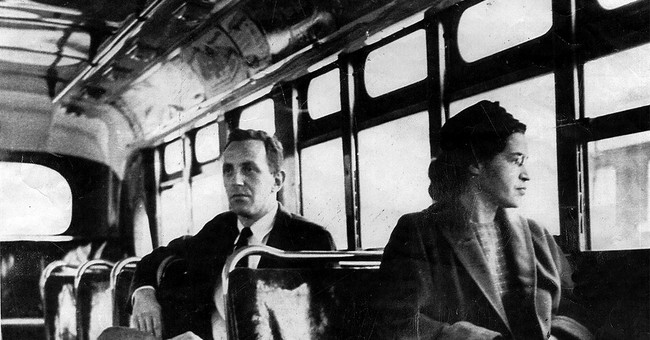Whether it's the events in Ferguson or the most recent media fed, manufactured crisis du-jour what always seem to be lost in the "debate" is how often the problem is not about race or bigotry, but about the jack-boot of government, stomping on the faces of people of all races, creeds and colors. Parsing or comparing misery by sub-groups is counter productive, however, it is the favorite parlor game of the MSM. Given that they are an agent or a tool of the previously mentioned government, this should not surprise. As a result, we don't learn from history, we just keep repeating it. And then mournfully, ask ourselves "Why?....Peace.
Preview by Yahoo
| |||||||
"The nine most terrifying words in the English language are: I'm from the government and I'm here to help."
- President Reagan Aug. 12, 1986
Walter E. Williams - Please Stop Helping Us
Riley points out that there has been significant achievement among the black middle class but that wide black-white gaps remain with respect to income, ...
| |||||||
Preview by Yahoo
| |||||||
JULY 30, 2014
Please Stop Helping UsWalter E. Williams7/30/2014 12:01:00 AM - Walter E. Williams
While reading the first chapter of Jason Riley's new book, "Please Stop Helping Us," I thought about Will Rogers' Prohibition-era observation that "Oklahomans vote dry as long as they can stagger to the polls." Demonstrative of similar dedication, one member of Congress told Vanderbilt University political scientist Carol Swain that "one of the advantages and disadvantages of representing blacks is their shameless loyalty. ... You can almost get away with raping babies and be forgiven. You don't have any vigilance about your performance." In my opinion, there appear to be no standards of performance low enough for blacks to lose their loyalty to their black political representatives.
Riley says that between 1970 and 2001, the number of black elected officials skyrocketed from fewer than 1,500 to more than 9,000, but black poverty has remained roughly the same. Between 1940 and 1960, when black political power was virtually nonexistent, the black poverty rate fell from 87 percent to 47 percent. Riley points out that there has been significant achievement among the black middle class but that wide black-white gaps remain with respect to income, educational achievement, unemployment, labor force participation, incarceration rates and other measures. Despite political gains, there have been dramatic reversals in teen unemployment, crime, out-of-wedlock births and family stability. Political power is neither a necessary nor a sufficient condition for socio-economic progress.
Riley lays out the devastating deal black political leaders and civil rights leaders have made with labor unions, in his aptly named chapter "Mandating Unemployment." Black leaders of the past recognized that labor unions were hostile to the interests of ordinary blacks. Frederick Douglass, in his 1874 essay "The Folly, Tyranny, and Wickedness of Labor Unions," argued that unions were not friends of blacks. W.E.B. Du Bois called unions "the greatest enemy of the black working man." Booker T. Washington also opposed unions because of their adverse impact on blacks.
....
Riley's "Educational Freedom" chapter details the sorry story of black education. Between 1970 and today, educational spending has tripled and the school workforce has doubled, far outpacing student enrollment. Despite these massive increases in resources, black academic achievement is a national disgrace. According to the National Assessment of Educational Progress, known as the nation's report card, black 17-year-olds score at the same level as white 13-year-olds in reading and math. White 13-year-olds score higher than black 17-year-olds in science.
A number of studies show that black students who attend private and charter schools do far better than their peers in public schools. If there were greater parental choice, through educational vouchers, black achievement would be higher. However, teachers unions see school choice as a threat to their monopoly, and virtually every black politician, including the president, backs the teachers unions.
At an 1865 gathering of the Massachusetts Anti-Slavery Society, Douglass said everybody had asked, "What should we do with the Negro?" Douglass said: "I have had but one answer from the beginning. Do nothing with us! Your doing with us has already played the mischief with us." Later on, Washington explained, "It is important and right that all privileges of the law be ours, but it is vastly more important that we be prepared for the exercise of these privileges." It's the abandonment of these visions that accounts for the many problems of today that Riley's book does a masterful job of explaining.


No comments:
Post a Comment